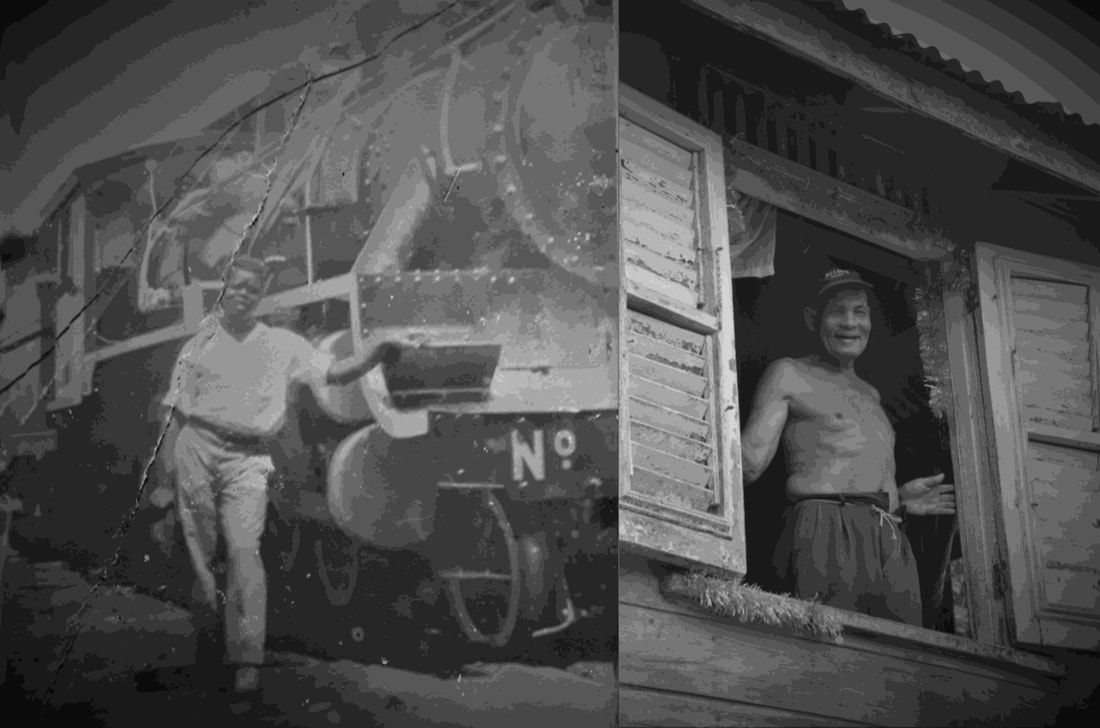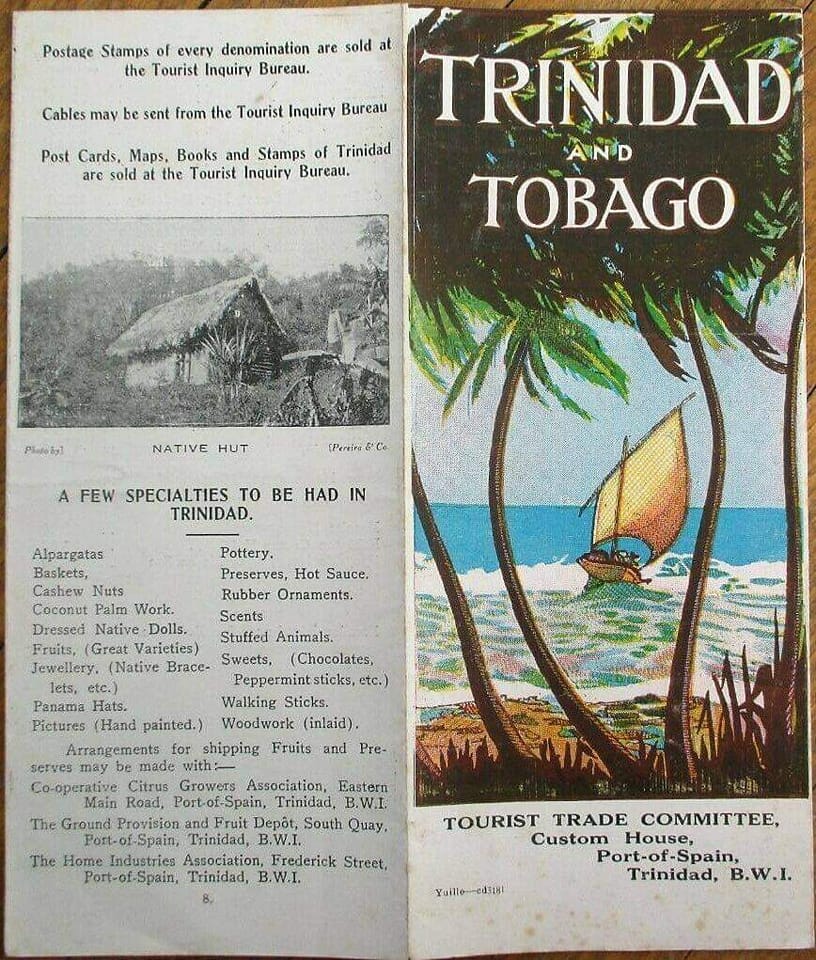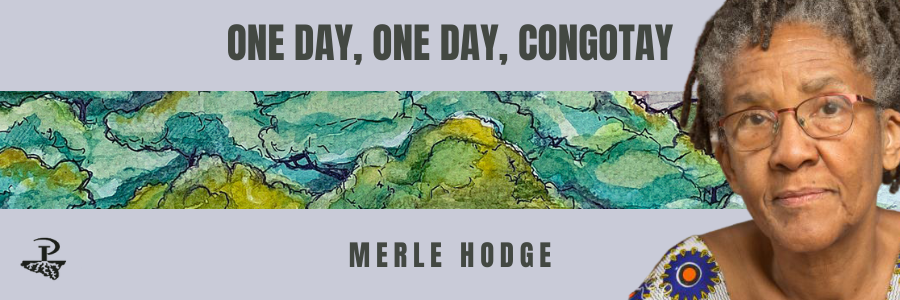|
TAKEN FROM Angelo Bissessarsingh's 2012 Archive
Monos Island is now best known as a holiday resort, but for the latter part of the 18th century, well into the 1920s it was an actual community with public officers, a chapel, and families who resided there all year round. The bays of the island were each occupied by a family, foremost among them being the Tardieus who were the great whalers and fishermen of Trinidad in a bygone era. Brave, hardy and hospitable, the Tardieus were well known as boat-builders as well as fishermen and were synonymous with Monos for nearly two centuries. Outsiders were few in the isolated island paradise . In 1849 one of the Tardieu girls married a ruddy Scotsman named William Morrison. He settled in La Vallette (later called Grand Fond) Bay and held the post of Government Bailiff (sort of like a Ward Officer charged with collection of rates and taxes) at the puling salary of one pound eighteenpence per month. As such, he farmed and fished to support his wife and family, and who lived like the Swiss Family Robinson in their solitude. The great English author, Charles Kingsley visited Trinidad and Monos too in 1870. He was enchanted by the lifestyle of Morrison and his brood and soliloquized thus: “We beached the boat close to the almond-tree, and were welcomed on shore by the lord of the cove, a gallant redbearded Scotsman, with a head and a heart; a handsome Creole wife, and lovely brownish children, with no more clothes on than they could help. An old sailor, and much wandering Ulysses, he is now coast-guardman, water-bailiff, policeman, practical warden, and indeed practical viceroy of the island, and an easy life of it he must have. The sea gives him fish enough for his family, and for a brawny brown servant. His coco-nut palms yield him a little revenue ; he has poultry, kids, and goats' milk more than he needs ; his patch of provision-ground in the place gives him corn and roots, sweet potatoes, yam, tania, cassava, and fruit too, all the year round. He needs nothing, owes nothing, fears nothing. News and politics are to him like the distant murmur of the surf at the back of the island ; a noise which is nought to him. His Bible, his almanac, and three or four old books on a shelf, are his whole library. He has all that man needs, more than man deserves, and is far too wise to wish to better himself I sat down on the beach beneath the amber shade of the palms ; and watched my friends rushing into the clear sea, and disporting themselves there like so many otters, while the policeman's little boy launched a log canoe, not much longer than himself, and paddled out into the midst of them, and then jumped upright in it, a little naked brown Cupid whereon he and his canoe were of course upset, and pushed under water, and scrambled over, and the whole cove rang with shouts and splashing, enough to scare away the boldest shark, had one been on watch off the point. I looked at the natural beauty and repose ; at the human vigor and happiness : and I said to myself, and said it often afterwards in the West Indies : Why do not other people copy this Scot ? Why should not many a young couple, who have education, refinement, resources in themselves, but are, happily or unhappily for them, unable to keep a brougham and go to London balls, retreat to some such paradise as this (and there are hundreds like it to be found in the West Indies), leaving behind them false civilization, and vain desires, and useless show ; and there live in simplicity and content " The Gentle Life" ? It is not true that the climate is too enervating. It is not true that nature is here too strong for man. I have seen enough in Trinidad, I saw enough even in' little Monos, to be able to deny that ; and to say, that in the West Indies, as elsewhere, a young man can be pure, able, high-minded, industrious, athletic : and I see no reason why a woman should not be likewise all that she need be. A cultivated man and wife, with a few hundreds a year—just enough, in fact, to enable them to keep a Coolie servant or two, might be really wealthy in all which constitutes true wealth and might be useful also in their place ; for each such couple would be a little centre of civilization for the Negro, the Coolie and it may be for certain young adventurers who, coming out merely to make money and return as soon as possible, are but too apt to lose, under the double temptations of gain andof drink, what elements of the " Gentle Life " they have gained from their mothers at home.” The rapture which Kingsley felt over the Morrison clan at Monos must have been real indeed for seventeen years later, the Scotsman was still on the island albeit a bit frailer and was described as follows : “Monos has good water, several roomy houses, and capital bays for bathing, but the cultivation is not so good as it might be, since it is infested with parasol ants. One of Kingsley's 'At Last' heroes, Mr. Morrison, is still to the fore, though a little more weather-beaten than in the days when Kingsley dubbed him the ' much-wandering Ulysses.' Morrison died in 1904 and was buried in the sandy soils of his beloved La Vallette Bay His wife, Charlotte Tardieu, also seems to have been all that a pioneer woman needed to be. Indeed, many years after her death, Capt. Percy Fraser, a former Superintendent of Prisons who had visited the place as a youth in the 1880s and 1890s, wrote in the 1940s: “How many can remember Monos at the time I am writing about? Who remembers old William Morrison and his wife Tante Charlotte” as we youngsters called her and his large family of sons and daughters who were all born on Monos?. Old Morrison was a Scot and a typical one at that. He was a seaman who called here in his youth and married in the Dehere or Tardieu family who at the time owned Bays at Monos and Scotland Bay. At the time I am referring to , the Morrisons lived at Grand Fond Bay , subsequently owned by the Lack family and now by Mr. Albert Siegert (grandson of Dr. J.G.B Siegert of Angostura Bitters fame) . It was taken over by the Americans lately (during WWII) for military purposes. They (Morrisons) kept cows , goats and pigs and cultivated coconuts . People occupying the neighbouring bays got their milk from them. They baked their own bread which they also supplied to the Bays. Tante Charlotte was also the local doctor and whenever anyone fell sick in any of the Bays she was sent for. She readily answered the call and prescribed her well known and efficacious local remedies . Her cheerful disposition was quite sufficient to make a sick person feel better. At Grand Fond they had mango trees of all kinds and we boys enjoyed nothing better than to row over there during the mango season and enjoy that luscious fruit to our hearts content. Whenever we arrived, old Morrison would send one of his men to pick coconuts for us. After drinking as many as we could consume, we would load our boat with nuts to take away. We also enjoyed a glass of fresh milk, either cow or goat. Old Morrison held several posts at Monos under the Government . Postmaster, Harbour Master, Bailiff , Road Officer-there was a road from Kenny’s Bay to Domus Bay, for the upkeep of which he was responsible, Special Constable, Wreck Officer, Customs Officer etc. He was an expert fisherman and no one else knew the various banks or currents better than he. He also took part in the whaling industry which at that time flourished, He was responsible for many rescues at sea.” This amazing man and his wife lived and died on Monos where they had carved their own utopia, so much so that even though many of their children left the island , three remained in the old house long after the deaths of their parents. The great historian, Fr. Anthony De Verteuil traced the last part of the Morrison saga on Monos and it is this; Patrick Morrison and his spinster sisters, Misses Aggie and Lolotte remained in the old house. Patrick owned a fishing boat called the Oily Oyster from which he harvested the bounty of the sea while Lolotte was Postmistress for Monos, a post she inherited from her father. She was known for floating about in her voluminous skirts on a bamboo raft, bonneted in a Mexican sombrero!! The siblings eked out a living , earning some cash by occasionally moving into the servant quarters at La Vallette and renting out the main house to holidaymakers in the 1920s. Finally, Patrick and Aggie died and Lollotte was left alone. She sold the house and bay to Sir Geo. F. Wight, a millionaire business tycoon from Port-of-Spain who resold it to Gerard Montano, a San Fernando businessman . He had the house demolished in order to build a new villa and workmen were badly frightened when in one of the rooms of the old Morrison home, a 15 foot macajuel snake (Boa Constrictor) was discovered. The superstitious workmen believed that Lolotte was a witch and the snake had been her pet. Source: Virtual Museum of Trinidad and Tobago. Feb 6, 2022)
0 Comments
Check it out here
On Christmas Eve 2011, William Edwards died at the San Fernando General Hospital, three days after falling ill. He was 87 years old and had outlived his wife, only child and every sibling. Edwards, who lived alone in his final years, was considered by some as a recluse, so his passing was unknown to many in his village of Brothers, Tabaquite.
Only a small circle of family and friends attended the funeral at Belgroves Crematorium to send him off. But a peculiar thing happened in the weeks following his passing. As news began trickling through the village that he had died, memories stirred, and “Eddie” was alive again in the mind’s eye of those who remember him. There he was, leaning out the open window of a locomotive, sounding the steam whistle, calling out to neighbours as his engine pulled the carriages carrying people, produce and cargo along the train line linking Rio Claro to the rest of the island. It turns out that Edwards, who found employment as a boilerman at Trinidad Government Railway (TGR) on June 30, 1942, had worked his way up to being an engine driver. He was in charge of one of the engines that travelled a system extending between Port of Spain and as far as Siparia, Sangre Grande and Princes Town. By the time his employer made him redundant and sent engine driver Eddie home on October 25, 1966, he was a man with a skill no one needed. He would later find employment as a wardsman at the same hospital where he would die. Last train For the citizens who used the line between Jerningham Junction and the stops in Longdenville, Todd’s Road, Caparo, Brasso, Tabaquite, Brothers, San Pedro and Rio Claro, Eddie would always be remembered as the man who drove the train to Rio Claro the last day it ever carried passengers—August 30, 1965 (the same day of the celebrated “Last Train to San Fernando” from Port of Spain). The Express spent several days following the path of the railway out of Rio Claro to discover that two generations after the end of the rail, many still have vivid memories and unresolved complaints. Some blame the economic and infrastructural decline over the decades on the State’s decision to replace the railway with buses. People wanted to know why no one had thought to preserve the TGR buildings, signal boxes, road crossings and platforms. The people of Dades Trace where a TGR building still exists, asked why no one had maintained the impressive homes of the station masters—Coudray, Villafana, McAllister, Mitchell, Superville, McIntosh—who were of significant social standing. Like clockwork Does anyone know how important this rail line was back then, asked villager Lucy Ashby. She said that back then, it was either the train or having to foot it out of her village of cocoa plantation workers. Now, the only evidence of its existence, said Ashby, were the concrete and steel bridge crossings too difficult for scrap dealers to steal. Her sister, Angela Charles, who paid four cents to travel by train into Rio Claro to see Carnival in the ’50s, said she often wondered what would have become of her life if the train, which allowed travel into the capital, had continued operating. Khairoon Shah, who was 88 years old when we spoke with her, said as a newlywed, she was walking the kilometre or so to Brothers Station as far back as 1942 to catch the train to visit her family in Libertville. “That engine was loud and you knew it was coming from the long trail of black smoke from the chimney. One headed up to Rio Claro for 9 a.m., passing back at 11 o’clock. Another went up at 2 p.m. and back down at four. And the train was always there on the exact time, bringing people and mail, bread, ice, carrying back cocoa and coffee and sugar cane. So you had to be there or you lose out,” she said. Shah said on the final day the passenger train rolled, “Edwards was the one who drove it from Jerningham. They gave a free ride and we rode all day and in the night.” Her son, Khairoon Shah, said he, too, as a teenager, understood something big and sad was happening that day when the seven cent fare from Brothers Station to Rio Claro was waived. “They never should have scrapped it. The village felt connected then. When it stopped running, it killed this area,” he said. Photographic memory As a result of a series of fortunate events, one of the most substantial Trinidad Government Railway buildings outside of Port of Spain still exists where the Brothers Station stood. The family of the ticketmaster remained occupants of the building when the train service ended, and on January 13, 1975, it was acquired by Stephen Subero, himself a lifetime worker with the railway. The building, likely used by the stationmaster, comprises a living area, three bedrooms and a detached kitchen, which prevented the entire house from going up in flames in the event of a fire there. The outhouse is also still there, along with two concrete cisterns to supply the property, locomotive and passengers of the time. Subero, who raised ten children in that building, recalled when the carriages pulled up and villagers came with their bull and donkey-drawn carts to collect the items they had purchased from “town”. “Let nobody fool you, nothing about the rail was easy. My father (Henry Ayers) had the job of checking the line (all 13 or so kilometres) from here to Rio Claro before 6 a.m. to make sure no big tree fall across. Only when he say so, the train would run,” he said. Despite a hard life, Subero said he recognised early that the building in which he made a life was different. “People from all over Trinidad have come here to ask questions about the train and take photographs. I never had photos because back then it was survival. I walked barefoot for the first 36 years of my life. But these people who come here want to learn about the railway. They amazed this place still here. So as long as I am alive, I will take care of it,” he said. Subero, who can trace his family back to Venezuela, then declared that he was the former bandleader of the Naya Sangeet Orchestra of Brothers Road, and sang for us an Indian classical composition. The Express found some of Eddie’s relatives in Pleasantville, San Fernando. They remembered a proud man with a photographic memory. He was also a stick fighter, cricketer, had a passport but never left Trinidad, and got a driver’s permit but never owned a car. What he loved most, they said, was telling stories about his time as a railway man and was disappointing that his knowledge and name never became part of the public record. Now they are. (Source: Daily Express, Feb 16, 2022) • Note: Richard Charan can be contacted at [email protected]. CAGIS Virtual is a new program that brings STEM into your home with weekly, hands-on, live sessions led by real experts!
CAGIS Virtual events explore a new topic each week with fun virtual and hands-on activities led by real experts and a CAGIS instructor. Each session includes an introduction to the topic, a hands-on or virtual activity, and time for questions at the end. Sessions occur on Saturdays at the following times: Ages 7-12: 8 am Pacific • 9 am Mountain • 10 am Central • 11 am Eastern • 12 pm Atlantic Ages 11-16: 10 am Pacific • 11 am Mountain • 12 pm Central • 1 pm Eastern • 2 pm Atlantic To become a member, Join Now. CAGIS Virtual sessions are open to non-members for $16 per session. Registration will be open to members before the general public. Did you know you can purchase tickets to CAGIS Virtual sessions as a gift? Available here. Schedule Upcoming events will be posted at least one month in advance. Members will have access to event sign up links before the general public. We expect to always have enough space for all sign ups. However, in the event of a very popular event, spaces will go on a first-come-first-served basis with others added to a waiting list. The schedule is subject to change, pending changes in host availability. For more information: https://girlsinscience.ca/join/ Hearty congratulations to Mr. Edwin Ayoung - Crazy on receiving the Humming Bird Medal - Silver in the Spheres of Music and Culture at the National Awards 2020 held on Monday 7th March 2022. (Source: Trinbago Golden Memories).
While most other 16-year-old girls are spending their time chatting with friends on social media, going shopping and all those other fun things teenagers usually do, Camryn Champion is preparing to wow the judges at the next round of the 20th season of American Idol, a reality television series in which aspiring singers compete for a recording contract and a shot at making it big in the music industry.
Champion put new meaning to her name when, from among the thousands of people who auditioned for the show, she earned herself a golden ticket to Hollywood on February 27, which secures her advancement to the next round in the competition. Champion's maternal grandparents Quinn and Vidya Jogie are originally from Chaguanas, Trinidad and now live in Long Island, New York. She said her grandmother is a big Idol fan and always encouraged her to audition, believing she could make it all the way to the top. Champion agreed to do it when she was old enough, but said although her life revolved around music, deep down she never believed she would get the opportunity to do so. But then the unimaginable happened and she found herself on a stage in Nashville auditioning for singers Katy Perry, Lionel Richie and Luke Bryan, just like her grandmother predicted. "I was super interested in music since I was about four and I started writing my own music when I was 12. In 2018, I entered a singing competition in New York called Coast 2 Coast Live and I won first place," the New Jersey resident told Sunday Newsday in a phone interview. This win drew attention to what the then 13-year-old was capable of and paved the way for her grandmother's dream come true. "After I won that competition, they (talent scouts) asked my parents if I wanted to audition for Idol." Because of the covid19 pandemic, Champion said the initial part of the process was virtual. "I just had to send in videos, did interviews on Zoom calls and I had to sing online. When I made it through that round, I went to Nashville to audition live before the judges." There, Champion put her heart and soul into her performance of Sam Smith's I'm Not the Only One. She said she chose that song because, apart from liking Smith's music, she felt the tone was good for her range. "It was nerve wracking," she said about her turn in the spotlight and under heavy musical scrutiny. "I was really nervous because I was the third person to audition out of the day one auditions and I was one of the younger contestants. The first girl who auditioned came out crying, making me even more nervous." But as skittish as she was, the judges made her feel hopeful that she would get through to the next round when, after her performance, they encouraged her to delve deeper, relax and just embrace the song. She said she never expected them to be so "cool" and didn't think that she'd get to talk to them, even off camera. "It was really a super cool opportunity. I was so close to the judges and they were all so nice. The entire experience was great. I had never been to Nashville, so I got to see a new place. In Nashville there is music everywhere, so I loved that so much." And as excited as she is about the next round, Champion has had to hold her tongue about it because of her contractual obligation to American Idol. "I’m not allowed to talk about what happens in the future with the show...But I can say that the winner gets a cash prize and they're signed to an American Idol contract to help promote their music." Champion said she doesn't have a specific preference as it regards listening to music. But for singing, she leans toward R&B. "I just like music on a whole. Each artiste is so different and it’s cool to have role models in different genres." With no formal training, her talent is all natural and something she's "just always done it," even going so far as teaching herself to play the piano. But, she told WMN, because music has always been "the dream" it may be time to start formalising it. "When I go to college I'd like to study performing arts, but also business to deal with that aspect of it." The junior at Rancocas Valley Regional High School said the only other thing she loves as much as music is volleyball and is on her school's team. And although she has never been to TT, she is familiar with the beauty and tastes of the islands because her relatives frequently visit. "My sister dances a lot and is always dancing to soca. I too love the music, and we all love the food because my family cooks Trini food all the time. I always hear about the beaches, food and the music and I'm just so jealous of everyone. I'd really love to visit some time." For now, though, the focus is on the goal of becoming the next American Idol. (Source: Newday, March 12, 2022) A trip down memory lane courtesy the Angelo Bissessarsingh Virtual Museum of Trinidad and Tobago.
Triinidadian writer Merle Hodge began her career by publishing what would become a beloved Caribbean classic, Crick Crack, Monkey, in 1970. Five decades later, as she prepares to publish her third novel, Hodge tells Andre Bagoo what took so long — and what drives her interest in capturing the often confusing experience of Caribbean childhood on the page.
Read the full story here or copy and paste the url into your browser https://www.peepaltreepress.com/blog/news-authors/interview-miseducation-merle-hodge-caribbean-beat?fbclid=IwAR26mvBDLSdXmeKARHh6J_-kRvfVLL6jebEp9V3QDiyPy0ZTDKl_WpgkRDU |
T&T news blogThe intent of this blog is to bring some news from home and other fun items. If you enjoy what you read, please leave us a comment.. Archives
July 2025
Categories
All
|








 RSS Feed
RSS Feed